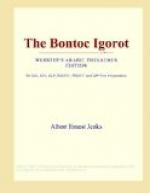The Igorot does not say that the entire spirit world, except his relatives, is against him, and he does not blame the spirits for the evils they inflict on him — it is the way things are — but he acts as though all are his enemies, and he often entreats them to visit their destruction on other pueblos. It is safe to say that one feast is held daily in Bontoc by some family to appease or win the good will of some a-ni’-to.
At death the spirit of a beheaded person, the pin-teng’, goes above to chayya, the sky. The old men are very emphatic in this belief. They always point to the surrounding mountains as the home of the a-ni’-to, but straight above to chayya, the sky, as the home of the spirit of the beheaded. The old men say the pin-teng’ has a head of flames. There in the sky the pin-teng’ repeat the life of those living in the pueblo. They till the soil and they marry, but the society is exclusive — there are none there except those who lost their heads to the enemy.
The pin-teng’ is responsible for the death of every person who loses his head. He puts murder in the minds of all men who are to be successful in taking heads. He also sees the outrages of warfare, and visits vengeance on those who kill babes and small children.
In his relations with the unseen spirit world the Igorot has certain visible, material friends that assist him by warnings of good and evil. When a chicken is killed its gall is examined, and, if found to be dark colored, all is well; if it is light, he is warned of some pending evil in spirit form. Snakes, rats, crows, falling stones, crumbling earth, and the small reddish-brown omen bird, i’-chu, all warn the Igorot of pending evil.
Exorcist
Since the anito is the cause of all bodily afflictions the chief function of the person who battles for the health of the afflicted is that of the exorcist, rather than that of the therapeutist.
Many old men and women, known as “in-sup-ak’,” are considered more or less successful in urging the offending anito to leave the sick. Their formula is simple. They place themselves near the afflicted part, usually with the hand stroking it, or at least touching it, and say, “Anito, who makes this person sick, go away.” This they repeat over and over again, mumbling low, and frequently exhaling the breath to assist the departure of the anito — just as, they say, one blows away the dust; but the exhalation is an open-mouthed outbreathing, and not a forceful blowing. One of our house boys came home from a trip to a neighboring pueblo with a bad stone bruise for which an anito was responsible. For four days he faithfully submitted to flaxseed poultices, but on the fifth day we found a woman in-sup-ak’ at her professional task in the kitchen. She held the sore foot in her lap, and stroked it; she murmured to the anito to go away; she bent low over the foot,




